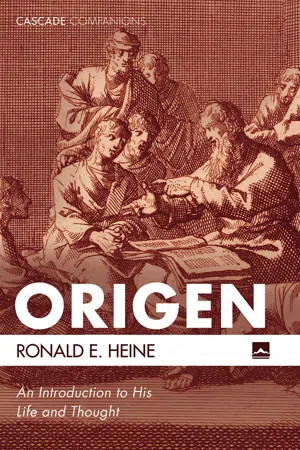![]()
Part I
A Sketch Of Origen’s Life
![]()
Chapter 1
Major influences that shaped Origen’s mind
John Donne’s poetic line, “No man is an island,” was certainly true of Origen. He was a man whose life and accomplishments depended on several key people, some of whom are unknown to us by name. The first two, as with most people, were his parents. His father Leonides was responsible for the beginning of the scholarly habits we know that characterized Origen’s entire life. It was also under the guidance of his father that he began to acquire his intimate knowledge of Scripture, which would be the foundation for his life’s work. The name of Origen’s mother is unknown, but it was her active intervention, both verbally and physically, that preserved his life for posterity. He was on the point of becoming a nameless, zealous, teenage volunteer martyr when his mother stepped in and prevented it. She acted, no doubt, out of a mother’s love, but her action preserved one of the most brilliant thinkers and leaders of Christian antiquity.
After Leonides’ death Origen was taken in by a distinguished, wealthy Christian lady in Alexandria. While it is not known for certain, it is most likely that this too was the result of the action of Origen’s mother looking out for him, for when her husband was martyred, his property was confiscated leaving her with seven children to raise, of whom Origen was the oldest. This unnamed Christian lady not only provided Origen with a home after his father’s death, but also financed his further education until he was able to earn a living on his own by teaching. Somewhat later Origen was also befriended and supported by another wealthy Alexandrian named Ambrose. Ambrose was a Valentinian Gnostic whom Origen had converted. They appear to have become close friends. The way Origen refers to Ambrose in some of his writings sounds as if he was present as Origen spoke. It was Ambrose who made the production of Origen’s many treatises possible. He set up, at his own expense, a scriptorium for Origen, which included several stenographers, copyists, and calligraphers to take down Origen’s dictated words and produce manuscript copies of his works. Many of Origen’s writings were also produced at the request, and sometimes prodding, of Ambrose. In the Commentary on John Origen refers to an agreement he had with Ambrose to produce books, and to Ambrose’s insistence that he work on these even in Ambrose’s absence.
The support of one other rather unknown man was also crucial to what Origen accomplished in his life. Demetrius, Origen’s bishop in Alexandria, seems to have been ambivalent about Origen. He must have recognized his exceptional intelligence and knowledge of Scripture as a young man, for he appointed him as catechist in the Alexandrian church when Origen was in his late teens. He never ordained Origen, however, which meant that Origen was never allowed to preach in the Alexandrian church. Nevertheless, Origen’s fame as an expounder of Christian teaching spread. He was invited to Palestine where Bishops John of Jerusalem and Theoctistus of Caesarea asked him to preach to their congregations and, at a later date, ordained him, which infuriated Origen’s Alexandrian bishop, Demetrius. The latter unleashed a vicious verbal attack on Origen, much of which he put in letters sent to bishops of other churches. This was a very low point in Origen’s emotional life. He talks about it in the prologue to the sixth book of his Commentary on John and describes how it interrupted his intellectual work as well as threatened his emotional state. He refers to the controversy as the “storm at Alexandria” and borrowing the imagery of the exodus of Israel, says, “We were rescued from the land of Egypt, when the God who led his people from Egypt delivered us.” The human deliverer of Origen from Alexandria was Theoctistus, bishop of Caesarea, who welcomed Origen to settle at Caesarea, put him to work preaching in the church, and provided the environment in which Origen could get on with his intellectual work. We know little more about Theoctistus. He had obviously perceived the genius in the teacher from Alexandria and welcomed him as a leader in the Christian community at Caesarea. This perceptive, rather unknown bishop provided Origen with the last platform for his life work. All his homilies, with the exception of one delivered at Jerusalem, were delivered and taken down by stenographers at Caesarea, and many of his most important treatises were composed there, such as his On Prayer, Exhortation to Martyrdom, Against Celsus, and commentaries on The Epistle to the Romans, and The Gospel of Matthew. Without these five rather obscure people on whom Origen’s life and work depended there would be little to write about him.
Origen’s early education under his father
Origen was born in A.D. 185 at Alexandria, Egypt, the son of Christian parents. His father Leonides was an educator by profession. His son followed hi...
